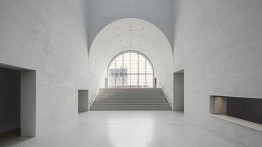Visiting Lecture | Fabrizio Barozzi, BAROZZI VEIGA: Sentimental Monumentality
Friday, November 15, 2019, 6:30 - 8:30pm

Barozzi/Veiga was founded in Barcelona by Fabrizio Barozzi and Alberto Veiga in 2004. The practice has since worked internationally in public and private projects and its work has received several prestigious distinctions. Its diverse international work includes mainly cultural and educational buildings.
Barozzi/Veiga´s work is characterized by the intention to arrive at solutions that are rooted in place, architectures that can be perceived over time and that have an emotional content. Concepts and ideas able to create particular atmospheres, which are architecturally clear and expressive, and able to have meaning by itself.
Barozzi / Veiga has won numerous prizes in national and international competitions. Its built work includes the Ribera del Duero Hq. (2011), the Auditorium of Aguilas (2011), the Szczecin Philarmonic (2014), the Music school in Brunico (2018) and the Fine Art Museum in Chur (2018). The recently completed projects include: the Musée Cantonal des Beaux-Arts Lausanne (2019) and the Zürich Tanzhaus (2019).
Fabrizio Barozzi, born in 1976, grew up in Rovereto, Italy, and studied architecture at the Istituto Universitario di Architettura di Venezia and went on to complete his academic studies at the Escuela Técnica Superior de Arquitectura de Sevilla and at Ecole d’Architecture de Paris La Villette. He has maintained a balance between his professional activity and his academic involvement. Barozzi has taught at the International University of Catalonia in Barcelona, the University of Girona, the Istituto Universitario di Architettura di Venezia, and MIT.
This lecture is free and open to the public.
View the full Fall 2019 Lectures and Events List.
Located in the Frederick P. Rose Auditorium, at 41 Cooper Square (on Third Avenue between 6th and 7th Streets)




